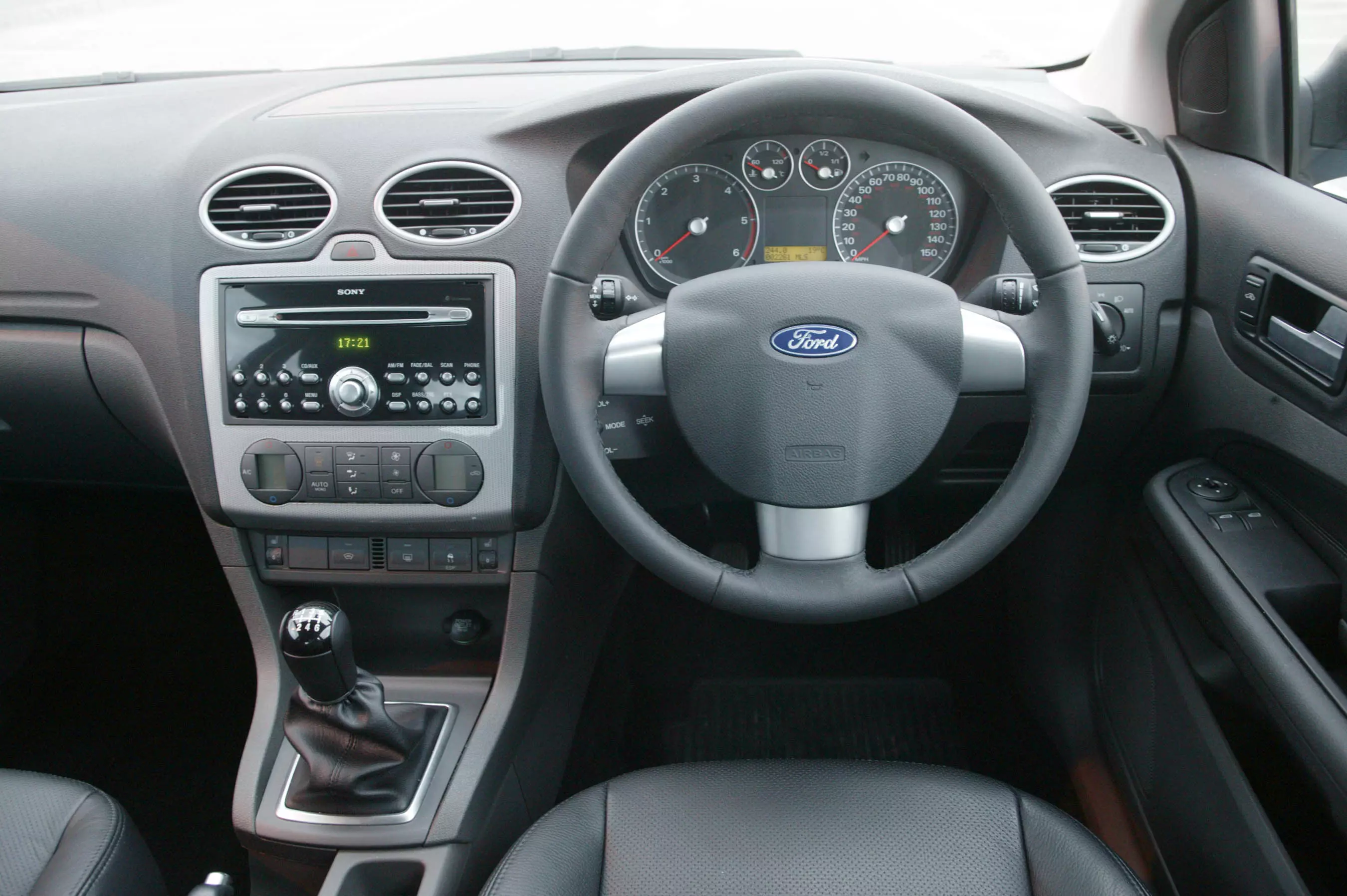
Money is tight, so Haynes is here to help you save money by sorting out your Ford Focus problems yourself. We can tell you what common problems you’re likely to encounter, show you how to work out where any problem lies, and how you can remedy it with as little expenditure as possible. And if you already own a Ford Focus Mk2, Haynes can keep your running costs to a minimum by guiding you as you service, maintain and repair it yourself.
The Ford Focus Mk2 has common problems that include leaky manual transmissions, a noise from the front wheels, inoperative remote-control keys and clogged diesel particulate filters on 1.6-litre TDCi models, plus the odd electrical glitch such as a dodgy exterior temperature sensor. However, none of these issues would cost a great deal to repair yourself; we can explain exactly what the issues involve and how a DIY mechanic can save cash by sorting them out at home.
We’re here to offer everything you need as you do it yourself with Haynes.
What recalls has the 2005-2011 Focus Mk2 been subject to?
The Mk2 Focus has become quite familiar with the inside of dealerships over its life, because it has been recalled a few times. For example, more than 80,000 cars were recalled because the engine cooling fan module could become corroded due to the ingress of winter salt. This could cause the fan to overheat and catch fire. More than 900 examples were recalled due to fuel return pipes that were of incorrect specification. Then almost 18,000 cars were recalled to have a faulty non-return valve in the vacuum pump. Incorrect power steering pipes also caused almost 15,000 cars to be recalled.
Check out this Focus Mk2 routine maintenance guide

What common problems does the Mk2 Focus have?
Many versions of the Mk2 Focus have been known to suffer from a brake warning light that illuminates in error, and the odd fuel leak. Some 1.6-litre TDCi models have suffered turbocharger failure, too.
In addition, it is not unknown for the remote key ‘plipper’ to suddenly fail to operate.
However, it’s easy to solve common problems for the Mk2 Focus with the Haynes Focus 2005-2011 manual or Autofix.

Does the Mk2 Focus have driveshaft problems?
Some drivers have noted that the Ford Focus Mk2 2005-2011 generates a creaking noise from its front axle as you pull away. An absence of driveshaft spline sealant is the cause, and it can be either driveshaft at fault, so you’ll need to get a friend to listen carefully as you pull away next to them to identify which side has the issue. The good news is that the procedure to replace the sealant is one that a DIY mechanic will be more than capable of completing without trouble.
Are brake warning light problems a Mk2 Focus issue?
There have been reports that some examples of the Mk2 Focus can have an issue that causes the brake warning light to illuminate. First, plug in a fault code reader (head here for Haynes' in-depth test of fault code readers). The code C1141 indicates that the front wheel speed sensor ring on the left front wheel hub is missing a tooth. If the code is C1142 then the same issue has affected the right-front wheel sensor ring.
The solution is to replace the affected wheel hub assembly, then to delete the fault codes from your vehicle’s memory.

Will my Focus Mk2 have a leaky transmission?
The Mk2 Focus Mk2 with the 1.4-litre or 1.6-litre petrol engines can suffer an oil leak from its transmission.
The cause of the fault is usually an incorrectly fitted right-hand driveshaft, which then damages the gearbox seal. However, the removal and replacement job is one that a DIY mechanic will be more than capable of completing without issue.
Solve transmission problems for the Focus Mk2 with the Haynes Focus Mk2 2004-2011 manual or Autofix.
Does the Mk2 Focus have remote key problems?
Some owners of the Mk2 Focus have reported failure of the remote ‘plipper’ key. The source of the issue is almost always a dead battery in the key, and this is easy to swap. The procedure is covered in the Haynes Focus Mk2 2005-2011 manual or Autofix.
Has the alternator failed on your Focus Mk2? Watch our FREE video here on how to replace it.
Are turbocharger problems a known issue with the Mk2 Focus?
A faulty turbocharger has been known to affect some versions of the Mk2 Focus with the 1.6-litre TDCi engine.
The turbocharger cannot be repaired, so the only solution is to replace it. This is a lengthy and involved procedure, but is one that’s well within the scope of the home mechanic, especially with Haynes guiding you along the way. It is covered in the Haynes Focus Mk2 2005-2011 manual.

Can the Focus Mk2 have fuel leak problems?
If you have a 2.0 TDCi Focus Mk2, one of the issues it might suffer is a fuel leak.
The fault lies in an incorrectly installed fuel injector return line, and it can cause numerous fault codes to appear (P0087, P0089, P062B, P1200, P0200, P1551, P1554). The solution is to remove the affected fuel injector and to renew the fuel injector return line.
This is a job that a DIY mechanic will be able to carry out by following the procedure in the Haynes Focus Mk2 2005-2011 manual or Autofix.

Does the Mk2 Focus have diesel engine problems?
Focus 1.6 TDCi common problems
This diesel engine (it stands for turbdodiesel common rail injection) can have DPF issues (diesel particulate filter). Symptoms of a clogged DPF include engine oil contaminated with fuel and a rise in engine speed.
In most cases, the DPF and additive have not been renewed at the scheduled time. Power loss accompanied by the engine warning light and a noise from the turbocharger could spell turbo replacement. The Haynes manual for the Mk2 Focus explains how to replace the particulate filter.
Still on the 1.6 TDCi engine, a difficult engine start could be an incorrect camshaft position sensor air gap, and a fluctuating and vibrating idle with power loss, white smoke and a default to limp-home mode, a faulty mass airflow sensor. The relatively simple job of replacing the MAF on the Focus 1.6 TDCi is explained in chapter 4a - Fuel and exhaust systems of the Haynes manual.
A jerky movement from the engine with no increase in speed is probably caused by a faulty accelerator pedal (check the pedal position sensor - find out how to replace it as part of the pedal assembly in chapter 4a), and a default to limp-home mode with fault codes P0489, P2141 and P042E, a faulty EGR valve.
The same Mk2 Focus EGR valve could be the source of general poor running problems (chapter 4b, section 4), while a faulty instrument panel could be the cause of an engine unable to start or turn, or simply stall intermittently. Alternatively, a faulty fuse connector in the engine compartment fuse box could be responsible. Head for chapter 12, section 3 to find out the location of the Focus's fuse boxes (there are two).
Still with the 1.6 TDCi, if the engine turns but doesn't start, and there’s no communication between the engine diagnostic tool and several control units (ABS, power steering and engine), check for faults codes U2516 and B2139 at the engine compartment junction unit. If they’re showing, check for faulty connections at the instrument panel (chapter 12, section 10).
Limp-home mode, power loss and excessive black exhaust smoke accompanied by fault code P0299 at the engine control unit is a leak in the air inlet system. This component is detailed in chapter 4a, section 2 - a job rated by Haynes as 'Fairly easy, suitable for a beginner with some experience'.
A default to limp-home mode with power loss could also be caused by a faulty differential pressure sensor.
6 things you’d only know about the Mk2 Focus by taking it apart
If the Focus suffers from high engine compartment temperatures these could be caused by high exhaust gas temperatures, themselves caused by a damaged turbocharger air inlet pipe (find photos of it in chapter 4a, section 13).
Finally, on the 1.6 TDCi Focus, the starter motor failing to turn after the battery has been disconnected and reconnected, and with fault codes P1602 and B2139, could be because the passive anti-theft system (PATS) has not been initialised.
An incorrectly installed fuel return line was the subject of a recall. Power loss, fuel leakage and illumination of the engine warning light are the signs to look for.
Focus 2.0 TDCi common problems
The 2.0 TDCi engine (chapter 2c in the Haynes manual) can suffer most or all of the above plus difficult starting when cold (check for water in the fuel filter), engine stall and failure to restart (the fuel pressure may be too low so check the exhaust camshaft to high-pressure pump coupling), and power loss caused by faulty turbo operation (check if the turbo actuator has seized in the open position).
In addition, if the battery charge warning light remains on after the engine has started and the car shows fault codes P1632 and P0625, check the health of the alternator (chapter 5, section 5).

Why does your Ford Focus say it’s hot when it’s cold?
As with most cars these days, the Ford Focus Mk2 has a display that tells you how hot or cold it is outside.
Obviously, this is vital in winter because it can tell you when there might be ice around.
However, the sensor that gives the information to the display is not immune to the odd glitch, which isn’t surprising given that it’s outside in the worst conditions, day in, day out.
This can be a double issue, because if your Focus Mk2 has a climate control air-conditioning system, then an erroneous external temperature reading can cause the air-con to behave haphazardly. For example, if it’s 2C outside but the system thinks it’s 28C, then it’ll continualy try to reduce the cabin temperature, no matter what you’ve got it set to. Vice-versa if it’s hot outside but the system thinks it’s chilly. You’ll have to have the windows down before you know it.
Thankfully, the good news is that the sensor is sited down behind the front bumper, and is pretty easy to replace; the procedure is contained in the Haynes Focus manual.